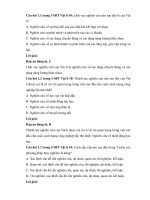- Trang chủ >>
- Khoa Học Tự Nhiên >>
- Vật lý
Campaign guide plight of the tuatha (1) 42
Bạn đang xem bản rút gọn của tài liệu. Xem và tải ngay bản đầy đủ của tài liệu tại đây (815.26 KB, 1 trang )
Chapter Three: Lore of Aeliode
And so the children of Tulhesa sought out Ochesa,
also called Volsung, in the hopes that he would be able
to aid them with their mother. They found him sitting
and sharpening his spear preparing to go out on a hunt.
‘Ochesa, please help us’ one said. ‘Paladrus has bewitched
our mother,’ said another. ‘She is not herself and plans
destruction’, a third spoke.
Volsung felt pity for the poor children of Tulhesa. He
listened to their stories about how poorly she treated them.
The children’s woe soon overtook Volsung’s senses and he
vowed to aid them in their plight.
Together they formed a plan to force Tulhesa to listen
to her children. Volsung would invite Paladrus on the
hunt that Volsung was preparing for, a hunt for the Great
Hind. Volsung would then slip away and return to Tulhesa’s
children and together they would convince Tulhesa of her
errors. Volsung would then return and finish the hunt with
Paladrus. In this way, the Children’s torments would cease.
And so it was that Volsung spoke to Paladrus and
Paladrus agreed to hunt with him for the Great Hind. As
Paladrus prepared to leave Tulhesa spoke thus ‘Do not leave
me my Brother, for I am tired and need to rest. Who would
watch over me as I do so.’ Tulhesa’s children then spoke up.
‘We shall watch over you,’ one said. ‘You will be safe,’ said
another. ‘Your life is in our hands,’ a third spoke.
Thus comforted, Tulhesa bade Paladrus farewell and
wished him luck on his hunt.
Soon Volsung had separated from Paladrus on their
hunt with the excuse that they could cover more area if they
went different ways. Volsung returned to where Tulhesa
lay sleeping and he saw her children prowling around her,
nervously pacing.
When they saw that Volsung had returned, they
began nipping at their mother’s tail. Their nips pierced
their mother’s hide and cause her to bleed. She awoke with
a start and cried, ‘My children, why do you wake your
mother so?’
‘We woke you so you will listen to us,’ one said. ‘We
woke you so you would share your power of creation with
us,’ said another. ‘Give us your power or Volsung will kill
you,’ a third spoke.
It was then she saw Volsung approaching her, his spear
in his hand.
‘Traitorous children,’ Tulhesa roared, ‘You shall not be
allowed to threaten your mother!’ She swatted her children
far from her and her children cried piteously in mock pain.
Volsung saw Tulhesa hurting her children and stepped
in front of them. ‘I am here to help your children’ bellowed
Volsung. ‘You will no longer be able to hurt them!’4
Round and round they circled; spear, teeth and claw
striking swiftly and drawing blood. Each time Volsung
struck Tulhesa, some of her blood landed on his flesh,
burning and enraging him. He grew stronger and succumbed to bloodlust as they fought till at last, with a spear
strike straight to Tulhesa’s heart, Volsung laid low the great
serpent.
Tulhesa’s children looked with fear upon Volsung as his
form had been transformed by the melee. ‘Your appearance
frightens us,’ one said. ‘You are no longer the Volsung we
know,’ said another. ‘We shall call you Balar now,’ a third
spoke.
Balar roared in victory over the slain body of Tulhesa,
reveling in the power of his might. He raised his spear
high above his head and spoke,’ Tulhesa’s blood flows as a
sea and from this day I shall wade through it as a ship sails
the oceans.’
Tulhesa looked up and spoke to her children thus5. ‘My
children, you have risen against your mother and for this
I curse you. Forevermore shall you plot against each other
as you have plotted against me. Forevermore shall you fear
4. It is interesting to note how much of the speech in this section between Tulhesa and Volsung had ambiguous meaning. It seems
that the unfortunate gods are only aware of the darkest meaning that can be attributed to the others words. For instance, when
Tulhesa calls her children “traitorous” and states that they will “not be allowed to threaten their mother”, Volsung only hears what
Tulhesa says and was unable to her the third child’s statement that she should ‘give [them] [her] power or Volsung will destroy
[her].’ If Volsung would have heard this statement, it is likely that he would have correctly interpreted Tulhesa’s threat as a means
of self-defense. Instead he only sees her actions as unprovoked violence towards her offspring.
5. Here is where one of the contradictions of Southern Imperial religious thought is shown plain. Their god Tulhesa is clearly slain
at this point in the story, and yet she still speaks and has motives of her own. According to this text it seems that death is not
really of concern as it does not seem to removes the gods’ ability to interact with their surrounding world. This makes it odd that
the gods grieve so much for the death of one of their number. Here, as elsewhere, Tulhesa speaks without any apparent difficulty.
Indeed, the priests of Tulhesa from the Southern Empire do seem to be connected to a divine source as the miracles they are able
to produce, while disturbing, are none-the-less powerful.
41
